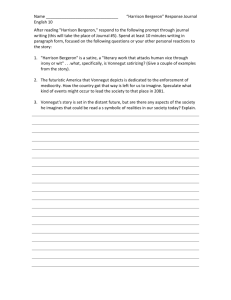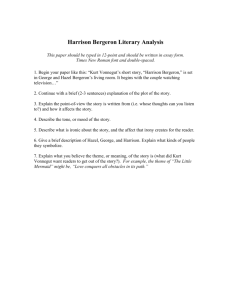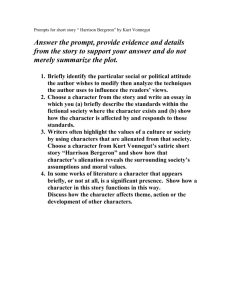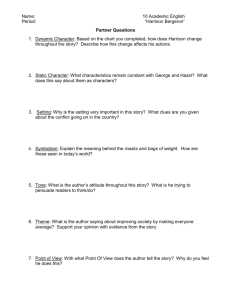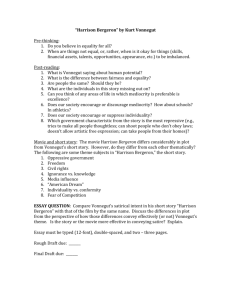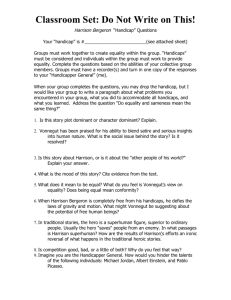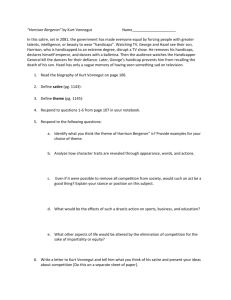Harrison Bergeron
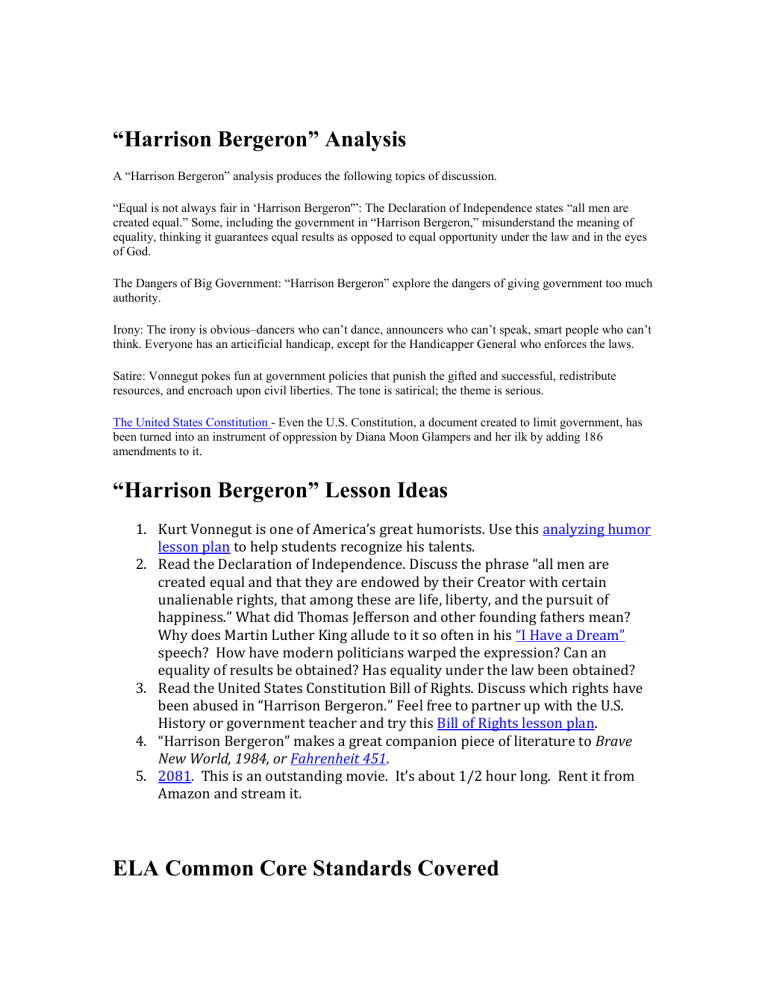
“Harrison Bergeron” Analysis
A “Harrison Bergeron” analysis produces the following topics of discussion.
“Equal is not always fair in ‘Harrison Bergeron'”: The Declaration of Independence states “all men are created equal.” Some, including the government in “Harrison Bergeron,” misunderstand the meaning of equality, thinking it guarantees equal results as opposed to equal opportunity under the law and in the eyes of God.
The Dangers of Big Government: “Harrison Bergeron” explore the dangers of giving government too much authority.
Irony: The irony is obvious–dancers who can’t dance, announcers who can’t speak, smart people who can’t think. Everyone has an articificial handicap, except for the Handicapper General who enforces the laws.
Satire: Vonnegut pokes fun at government policies that punish the gifted and successful, redistribute resources, and encroach upon civil liberties. The tone is satirical; the theme is serious.
The United States Constitution - Even the U.S. Constitution, a document created to limit government, has been turned into an instrument of oppression by Diana Moon Glampers and her ilk by adding 186 amendments to it.
“Harrison Bergeron” Lesson Ideas
1.
Kurt Vonnegut is one of America’s great humorists. Use this analyzing humor lesson plan to help students recognize his talents.
2.
Read the Declaration of Independence. Discuss the phrase “all men are created equal and that they are endowed by their Creator with certain unalienable rights, that among these are life, liberty, and the pursuit of happiness.” What did Thomas Jefferson and other founding fathers mean?
Why does Martin Luther King allude to it so often in his “I Have a Dream” speech? How have modern politicians warped the expression? Can an equality of results be obtained? Has equality under the law been obtained?
3.
Read the United States Constitution Bill of Rights. Discuss which rights have been abused in “Harrison Bergeron.” Feel free to partner up with the U.S.
History or government teacher and try this Bill of Rights lesson plan .
4.
“Harrison Bergeron” makes a great companion piece of literature to Brave
New World, 1984, or Fahrenheit 451 .
5.
2081 . This is an outstanding movie. It’s about 1/2 hour long. Rent it from
Amazon and stream it.
ELA Common Core Standards Covered
Teaching “Harrison Bergeron” covers the following ELA common core standards for reading and writing.
1.
RL.9-10.1 Cite strong and thorough textual evidence to support analysis of what the text says explicitly as well as inferences drawn from the text.
2.
RL.9-10.2 Determine a theme or central idea of a text and analyze in detail its development over the course of the text, including how it emerges and is shaped and refined by specific details; provide an objective summary of the text.
Launchpad: “Harrison Bergeron,” by Kurt Vonnegut,
Jr.
Directions: This Launchpad, adapted from http://www.WhatSoProudlyWeHail.org
, provides background materials and discussion questions to enhance your reading and understanding of Kurt
Vonnegut, Jr.’s short story “Harrison Bergeron.” After reading the story, you can click on the videos to hear editors Amy A. Kass, Leon R. Kass, and Diana Schaub converse with guest host James W. Ceaser
(University of Virginia) about the story. These videos are meant to raise additional questions and enhance discussion, not replace it.
About the Author | Summary | The Story
Thinking about the Text
Kurt Vonnegut’s story paints a picture of a society that few of us would gladly embrace, even those of us who care deeply about social equality. It thus invites us to think about the society presented; its rebellious genius, Harrison Bergeron; as well as Vonnegut’s purpose.
A. The Society
1.
Describe Vonnegut’s America. Are there positive aspects of this society?
What is lacking?
2.
Why do you think it adopted its practices of making everyone equal in brains, beauty, and brawn?
3.
Is it a good thing for people to believe that no one is better than anyone else?
Would it be a good thing if, in fact, no person were better than any other person?
WATCH: Describe Vonnegut’s America .
B. Harrison Bergeron, the Character
1.
What do you make of Harrison Bergeron himself? Does he represent the
American dream to “be all you can be”?
2.
What do you admire about Harrison? Are there aspects of his behavior that concern you?
3.
Do we have any idea of what sort of ruler he might have been and toward what end he would have ruled? Would he be better or worse than the
Handicapper General and her agents?
WATCH: What do you make of Harrison Bergeron himself?
C. “Harrison Bergeron,” the Story
1.
With whom do you think Vonnegut sympathizes in the story? Does he present Harrison as a hero, or is the story heroless? Why?
2.
What is being satirized in this story? Why do you think Vonnegut wrote it?
3.
Is Vonnegut’s story finally a cautionary tale about the importance of freedom? Of individuality? Of human excellence? Or is he aiming at something else?
WATCH: What do you think is being satirized in this story?
Thinking with the Text
Vonnegut’s satire invites us to think, first and foremost, about the implications of the pursuit of equality in relation to the American creed. But the way of life he depicts also invites us to think anew about the meaning and importance of the “American Dream,” and about whether technology helps or hinders the
American character and our prospects for happiness.
A. Equality and the American Creed
1.
What is the American ideal of equality as conceived in both the Declaration of
Independence and the Gettysburg Address ? Do the two documents differ in how they describe equality? What does it mean when we say that “all men are created equal” or that they are all “endowed by their Creator with certain unalienable rights”?
2.
Is the society described in the story a fulfillment of the American principle or ideal of equality or a perversion of that principle or ideal?
3.
Is the possession of a right to pursue happiness hollow if we lack the ability to exercise it?
4.
Why do Americans love equality? Should we? Can the desire for it ever be satisfied?
5.
What do we owe those of our fellow citizens who are worse off through no fault of their own?
6.
Is it true that a society riven by inequality—based especially on the inequality of talents—cannot retain the attachment of all of its citizens?
WATCH: Is the society described a fulfillment of the American ideal or principle of equality or a perversion of it?
7.
If the two ideals—human excellence and equality—are in conflict, which one should we hold more dear? Must one be pursued at the expense of the other?
Are there some areas in life in which we wish for equality more than human excellence and others we don’t?
8.
In what way(s) or under what circumstances might the love of equality be compatible with competition? With the pursuit of excellence?
WATCH: Is the love of equality compatible with competition? With the pursuit of human excellence?
B. The American Dream
1.
The tagline for the 1995 movie version of Harrison Bergeron was: “All men are not created equal. It is the purpose of Government to make them so.”
Under such a view, what happens to the “American Dream”—that anyone can rise and prosper as a result of hard work and the application of his or her
God-given talents?
2.
What happens to the American Dream if it should turn out that God-given talents are profoundly unequal in their allotment?
3.
Is the American Dream fair or just?
4.
Which should society reward and respect most: personal effort or actual accomplishment?
C. Technology and the American Character
WATCH: Would you object if society sought equality not by handicapping the gifted but by lifting up the not-gifted?
1.
Would you object if society sought equality not by handicapping the gifted as in the story, but by lifting up the not-gifted, say through genetic engineering or biotechnological enhancement?
2.
In May 1961, about five months prior to the appearance of Vonnegut’s
“Harrison Bergeron,” Newton Minow, then chairman of the Federal
Communications Commission, gave a memorable speech titled “ Television and the Public Interest ,”which challenged his audience as follows:
I invite each of you to sit down in front of your television set when your station goes on the air and stay there, for a day, without a book, without a magazine, without a newspaper, without a profit and loss sheet or rating book to distract you. Keep your eyes glued to that set until the station signs off. I can assure you
that what you will observe is a vast wasteland.
You will see a procession of game shows, formula comedies about totally unbelievable families, blood and thunder, mayhem, violence, sadism, murder . . . and cartoons. And endlessly commercials—many screaming, cajoling, and offending. And most of all boredom. True, you’ll see a few things you will enjoy.
But they will be very, very, very few. And if you think I exaggerate, I only ask you to try it.
Since 1961, TV has grown in leaps and bounds, making Americans even more addicted to it than George and Hazel and their society were. But has it remained the “vast wasteland” that Vonnegut parodied and of which Minow spoke?
3.
Do other technologies like the Internet, Twitter, or instant messaging improve the American character? Our prospects for happiness? If so, how? If not, why?
Kurt Vonnegut
"Harrison Bergeron"
Study Questions
What are the implications of the opening sentence, "The year was 2081, and everyone was finally equal"
(7)? What happened? Are capitalism and American democracy dead? Did Soviet-style totalitarianism finally prevail? What does the elimination of advantages, difference, and competition suggest concerning the nature of the changes that have taken place?
Are such changes impossible under American capitalism or are they likely results of just such a system?
What human tendencies underlie the sort of world described by Vonnegut? Are these the end results of the progressive spread of middle class greed, envy, and pettiness (the character of, for example, the shoppers in
Updike's "A&P")?. What does the experience of America in the late twentieth century suggest? What does the popularity of shows like Oprah's and Rosie O'Donnell's hint at? Why are such figures role models?
What is given center stage in such shows? What about Barbie dolls redesigned to look more like "real" people? How about certain trends in elementary/secondary and even higher education (e.g. grade inflation)?
What of practices in organized sports for youth such as giving equal playing time regardless of ability, of not keeping score (and acting as if one didn't know what the score was); of giving medals to players on teams regardless of how they finished in their league?
What are the functions of the agents of "the United States Handicapper General" (7)? What threats to society do such agents combat? What political processes could lead to such absurdities? How is radical mediocrity achieved and enforced?
What actual developments, policies, trends involving government-enforced equalizing, "handicapping," in
America might Vonnegut be parodying in "Harrison Bergeron"? What conceptions of equality motivate such policies and trends?
How is the conception of equality related to basic forms of commercial life such as the commodity and money and the social roles of buyer, seller, and wage-laborer? (Consider what Marx observes about equality and simple commodity circulation on p. 291.) Do capitalist social forms inevitably produce tension around equality by spreading an anti-aristocratic ideology of equality, egalitarianism, that can provoke movements for social equality such as the civil rights movement or the feminist movement, while at the same time continually creating inequalities (at least of income and wealth)? Might the reliance in the story on the government to enforce equality point to such an irresolvable tension?
Former U.S. Senator from Nebraska Roman Hruska was (in)famous for saying, during the hearing for a poorly regarded (and ultimately unsuccessful) nominee to the U.S. Supreme Court: "Well, mediocrity should be represented in the Court, too." How does that sort of thinking relate to what Vonnegut's getting at with this story?
How are George and Hazel Bergeron described? What sort of life do they lead? What is Vonnegut parodying here? What does the story warn against? To what extent do television, radio, and the mass media generally function like George's mental handicap radio? (Consider Neil Postman's observation in his book
Amusing Ourselves to Death: "this ensemble of electronic techniques called into being a new world-a peek-a-boo world, where now this event, now that, pops into view for a moment, then vanishes again. It is a world without much coherence or sense; a world that does not permit us to do anything; a world that is, like the child's game of peek-a-boo, entirely self-contained. But like peek-a-boo, it is also endlessly entertaining" (77). "Infotainment" did you say?
Why is Harrison Bergeron such a threat to society? How old is he? How has he been "handicapped"?
What is the significance of the real Harrison suddenly appearing on the TV set where his escape from prison was being reported? Why does he repeatedly say, "I am the Emperor!" (11)? Is Vonnegut suggesting a return to feudalism and its aristocratic political institutions? Is this similar in some way to the case of
Ellison's protagonist on the stage of the Bingo game?
What is Harrison trying to accomplish? Can his actions be compared to those of Sammy in Updike's
"A&P"? (Harrison says "I shall now select my Empress!" while Sammy chooses his "Queenie"). What different sets of values clash in these cases? How are the young pitted against the old? How does the motif of the rescue of the 'damsel in distress' translate in socioeconomic terms? What is suggested concerning the ownership of the means of (re)production?
What is the significance of Harrison telling the musicians, "I'll make you barons and dukes and earls" (12)?
What different values underlie such ennoblement? What role do beauty and aesthetics play in Harrison's rebellion?
What is the meaning of Harrison's and the ballerina's flight-like dance and kissing? What is meant by the statement, "not only were the laws of the land abandoned, but the law of gravity and the laws of motion as well" (12)?
What is the meaning of Harrison and the ballerina being shot down by Diana Moon Glampers, the
Handicapper General? What are the suggestions of her name? What ethos is conjured by the mythological
associations of the Greek goddess Diana and the moon (e.g. virginity, coldness, sterility). How is the figure of Ms. Glampers similar to that of the manager, Lengel, in A&P?
Why does Hazel Bergeron forget what she is crying about? How is this similar to, for example, the case of
Mrs. Gradgrind in Dickens's Hard Times ? What is the meaning of the last words of the Bergerons, "that one was a doozy" (13)?
What's striking about Vonnegut's story is its hyperbole: equality is enforced in every identifiable respect. What are the appropriate limits to ensuring equality and why?
Perhaps the most famous foreign commentator on the USA is Alexis de Toqueville. A French aristocrat himself, Toqueville paid special attention to the American love of equality. Here are three passages from his Democracy in America, ed. J.P. Mayer, that seem especially appropriate for "Harrison Bergeron.":
"There is indeed a manly and legitimate passion for equality which rouses in all men a desire to be strong and respected. This passion tends to elevate the little man to the rank of the great. But the human heart also nourishes a debased taste for equality, which leads the weak to want to drag the strong down to their level and which induces men to prefer equality in servitude to inequality in freedom. It is not that peoples with a democratic social state naturally scorn freedom; on the contrary, they have an instinctive taste for it. But freedom is not the chief and continual object of their desires; it is equality for which they feel an eternal love; they rush on freedom with quick and sudden impulses, but if they miss their mark they resign themselves to their disappointment; but nothing will satisfy them without equality, and they would rather die than lose it" (57).
"No matter how a people strives for it, all the conditions of life can never be perfectly equal. Even if, by misfortune, such an absolute dead level were attained, there would still be inequalities of intelligence which, coming directly from God, will ever escape the laws of man" (537-538).
"When inequality is the general rule in society, the greatest inequalities attract no attention. When everything is more or less level, the slightest variation is noticed. Hence the more equal men are, the more insatiable will be their longing for equality" (538).
